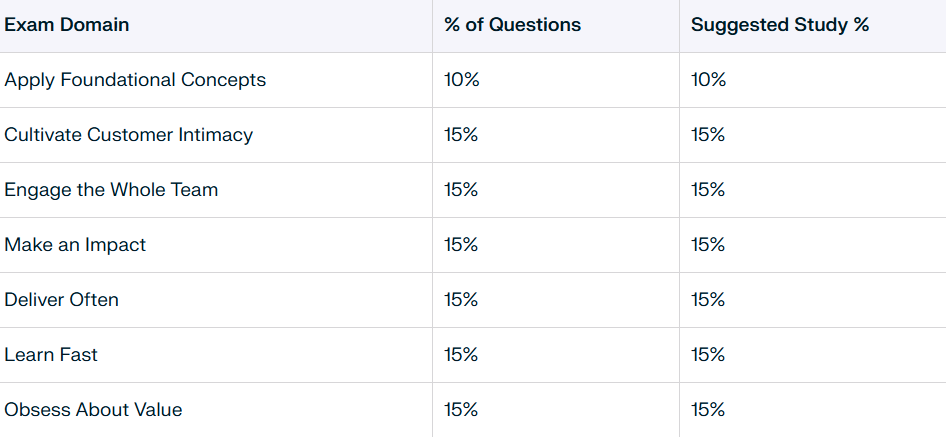CPOA Study Guide: Study Less, Score More - Pro Exam Blueprint
IIBA CPOA Study Guide: Study Less, Score More
Do you ever wonder why some candidates breeze through certification while others grind away for weeks, only to achieve similar or worse results? The secret isn’t just “studying harder” - it’s studying smarter, building on agile thinking, and leveraging proven tactics. If you’re aiming for the coveted IIBA Certificate in Product Ownership Analysis (CPOA), you’re already ahead of the curve. Let’s equip you with a focused CPOA study guide, actionable blueprints, and the mindset shifts you need for exam day dominance.
How Agile Principles Power Your CPOA Certification Journey
Agility isn’t just for product teams - it’s the ultimate study hack, too. Agile thinking prioritizes adaptive planning, early value delivery, and continuous learning. When applied to CPOA prep, you can “sprint” towards mastery, timebox your efforts, and regularly inspect and adapt your strategy. This approach transforms studying from a marathon into a series of fast, feedback-driven sprints, ensuring you don’t just memorize - you truly LEARN.
“Winning teams don’t just put in the hours. They work in cycles, test early, and pivot quickly. Your study plan should do the same.”
Part 1: Planning Your Learning Backlog - Set Smart Goals, Know the Exam
What is the IIBA CPOA Exam?
The IIBA Certificate in Product Ownership Analysis (CPOA) validates expert-level skill in agile product ownership and analysis. Offered by the International Institute of Business Analysis (IIBA), it is globally recognized by employers seeking high-impact, value-driven agile practitioners.
Exam Snapshot:
Duration: 90 minutes
Format: 60 multiple-choice, knowledge-based questions
Price: $250 (member), $400 (non-member)
Result: Pass/Fail
Delivered: Online, remote proctored
Syllabus Domains
Apply Foundational Concepts (10%)
Cultivate Customer Intimacy (15%)
Engage the Whole Team (15%)
Make an Impact (15%)
Deliver Often (15%)
Learn Fast (15%)
Obsess About Value (15%)
Key entities: CPOA (Certificate in Product Ownership Analysis), IIBA (vendor/certifying authority), exam domains (entities), outcomes (career growth, value delivery).
Additional costs: study guides, exam simulators, practice test packs (varies; bundles often cheaper)
Is the CPOA certification worth it?
If you want to cement your authority as an agile product owner or analyst, work globally, or boost your earning power, the CPOA is a strong investment. CPOA-certified professionals consistently report higher confidence, better performance on cross-team projects, and a strong career ROI.
“The CPOA gives you the language and frameworks to champion agile value delivery - boosting your credibility in any product-focused organization.” —IIBA-certified POA leader
Part 2: Timeboxing Your Prep for Maximum Domain Impact
Start with the exam blueprint. High-impact focus is non-negotiable! Here’s how to timebox your prep based on question weighting:
Domain Weights vs. Study Time
Tip:
Don’t over-invest in low-weight domains at the expense of core areas like Customer Intimacy, Team Engagement, and Value Maximization. Review the official IIBA CPOA Exam Syllabus, and plan short, high-intensity “sprints” for each competency.
Sample Agile Study Sprint (One-Week Cycle)
Day 1: Deep dive - Pick a domain (e.g., Customer Intimacy), review all official readings, and watch training videos.
Day 2: Practice with mock questions for that domain.
Day 3: Review missed questions, revisit concepts, and discuss tricky topics in a study group.
Day 4: Apply concepts to sample case studies.
Day 5: Take a full mini-quiz for coverage, note pain points.
Day 6: Focus review: hit weak spots, check official IIBA/ProcessExam explanations.
Day 7: Rest, then retrospective: jot down process improvements and sprint goals for next week.
Part 3: Sourcing Value from CPOA Question Banks and Exam Simulators
No CPOA study guide is complete without real exam practice. Here’s where to look:
Why Use CPOA Question Banks?
Realistic question formats: Simulate the scenario-based approach you’ll face on exam day.
Covers all exam domains: Ensures you don’t neglect key competencies.
Instant feedback: Pinpoints weak areas and tracks progress.
Timed mock tests: Boost confidence under exam pressure.
Where to find high-quality CPOA exam questions?
Official CPOA Bundles: Includes digital access, interactive videos, and practice questions - valuable for foundational understanding.
ProcessExam CPOA Question Bank: Frequently, by top scorers, this resource covers real-time scenarios and the most up-to-date case studies. Practice Now with CPOA Online Tests.
Third-party providers (Adaptive US, etc.): Review carefully for accuracy and updates.
Pro Tip:
Alternate between “open book” study sessions and closed-book, timed exam simulations. This bridges the gap between knowledge and recall - critical for the scenario-driven questions on the real CPOA exam.
Part 4: Sprint-Style Learning - Weekly Retros for Continual Improvement
Borrow a page from Scrum: conduct weekly retrospectives on your study process.
What sprint goals did you hit this week?
Which domains or question types caused friction?
Did you proactively adjust your backlog based on last week’s results?
“Exam readiness is a moving target - constant, honest evaluation fast-tracks you to confidence and mastery.”
Segmentation Tip:
If motivation dips, form a micro-study cohort. Online study groups (such as those hosted by IIBA chapters) provide accountability, diverse perspectives, and crowd-sourced solutions to tricky problems.
Retrospective Checklist
Did you complete all planned tasks for the week?
Which domains improved? Which needs more attention?
What tactics worked best? (Active recall, mind maps, peer teaching, case-study reviews)
What is your main sprint goal for next week?
Part 5: Common Traps to Avoid - Lessons from Past Test Takers
Let’s avoid mistakes - learn from those who’ve been there.
Most Reported CPOA Prep Regrets
Skipping scenario practice: Theory is necessary but not sufficient. Case-based practice is a must for agile decision-making.
Ignoring low-weighted domains: Even “only 10%” is enough to tip the pass/fail balance.
Leaving mock tests until the end: Early and regular testing builds resilience and pattern recognition.
Underestimating the Team Engagement domain: Collaboration and stakeholder skills are as testable as frameworks.
Last-ditch cramming: Waiting until the last 72 hours to address “unknown unknowns” creates stress and reduces retention.
What Smart Candidates Do
Schedule at least three full-length mock exams before the test day.
Mix individual study sprints with collaborative sessions.
Use exam simulators to stress-test time management.
Block distractions during focused study hours.
Document and reflect on common mistakes for future correction.
Part 6: Last-Mile Push - What to Prioritize in the Final 72 Hours
You’re nearly at the finish line. Here’s how to make your last sprint count:
72-Hour Checklist
Light review only: No major new material. Review domain summaries, quick notes, and cheat sheets.
Practice time-boxed mock tests: Replicate exam conditions, test your stamina, and refine pacing.
Focus on weak spots: Review flagged questions from previous practice exams.
Read official exam logistics: Double-check exam login, ID requirements, technical setup (do not use company-issued laptops)
Prepare your physical and mental environment: Rest well, hydrate, and mentally rehearse exam start and finish routines.
“What you do in the last 72 hours has an outsized impact. Use it to reinforce - not overload - your brain.”
FAQ
How do I register for the CPOA exam?
Register and purchase the exam or the exam + learning bundle directly through the IIBA certification page. You’ll have 12 months from payment to schedule your exam.
What is the format of the CPOA exam?
The CPOA exam is online, proctored, and consists of 60 multiple-choice questions over 90 minutes. It is scenario-driven and tests both theory and application.
Where can I find a CPOA question bank?
ProcessExam CPOA Question Bank (most popular, scenario-based)
Official CPOA Bundle (IIBA) and partner study guides
How much time do I need to prepare for CPOA?
Most successful candidates complete their prep in 2–3 months with structured, consistent study sprints of 5-10 hours per week.
What is the best way to prepare for the CPOA?
Map study sessions to blueprint domain weights.
Practice retrieval using CPOA exam simulators and question banks.
Conduct retrospectives and adapt your strategy each week.
Mix theory, real-world cases, and group discussions.
Ready to Practice?
Increase your odds of passing:
Start today with high-quality, scenario-driven CPOA practice tests and question banks trusted by recent passers and industry veterans alike.
Conclusion: Your CPOA Certification Blueprint - Agile, Adaptive, Unstoppable
The CPOA exam rewards those who use agile learning principles: value-focused prep, iterative improvement, and strategic sprints. By timeboxing your study, leveraging robust question banks, and always adapting, you maximize both your learning ROI and your career prospects.
Remember, the journey doesn’t stop at passing the exam - you’re building expertise to deliver real-world outcomes for teams and customers.
Start today: study less, score more, and bring agile thinking to every exam and work challenge ahead.


